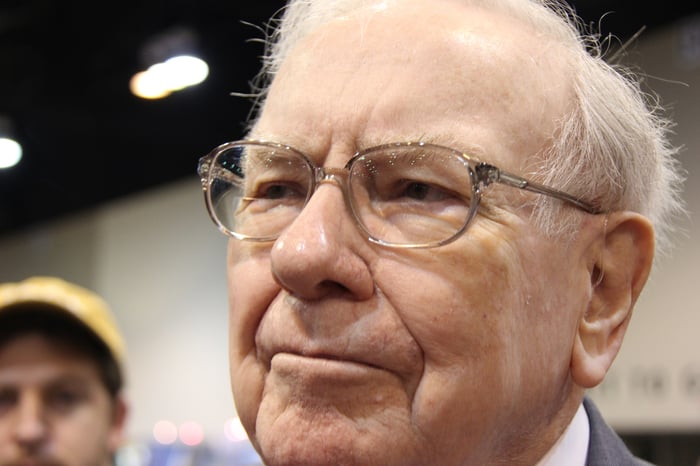Berkshire Hathaway (BRK.A -0.80%) (BRK.B 0.13%) CEO Warren Buffett is effectively in a class of his own when it comes to investing. Since taking the reins in 1965, he's led his company's Class A shares (BRK.A) to an aggregate gain of better than 3,600,000%, as of this past weekend. Put another way, Berkshire Hathaway's share price could collapse 99% and it would still be handily outperforming the benchmark S&P 500 since the beginning of 1965.
Although no investor is infallible, Buffett has a way of picking winners over the long term. It's why Wall Street and the investing community pay such close attention to the stocks he and his team buy and sell each quarter.

Berkshire Hathaway CEO Warren Buffett. Image source: The Motley Fool.
But an even more important exercise might be to note what sectors the Oracle of Omaha favors above all others. Though there are 11 different sectors to choose from, Buffett has demonstrated for more than a decade that he prefers to invest his money into three specific sectors.
Financials
Even though it's not the top sector in Berkshire Hathaway's portfolio, based on invested assets, there's little doubt in my mind that financial stocks are Warren Buffett's favorite place to put his money to work. By financials, I'm primarily talking about bank stocks, insurance companies, and payment processors.
Generally speaking, financial stocks aren't going to wow investors on the growth front. They're almost always cyclical businesses, which means they ebb and flow with the U.S. and global economy.
But there's an important distinction to make about these ebbs and flows. Whereas recessions typically last for a couple of quarters, periods of economic expansion are commonly measured in years. Disproportionately long bull markets are what allow bank stocks and payment processors to thrive over the long run.
Within the financial space, bank stocks tend to be Buffett's favorite, followed by insurance companies. Over the past decade, Bank of America (BAC 2.10%) and U.S. Bancorp (USB -1.31%) have been among Buffett's top buys.
The most appealing aspect of Bank of America is its interest rate sensitivity. Among money-center banks, none sees their net-interest income move up or down more due to interest rate yield curve shifts than BofA. This is particularly noteworthy with the Federal Reserve aggressively raising interest rates to counter historically high inflation, which hit 9.1% in June 2022.
Every rate hike allows BofA to collect more on its outstanding variable-rate loans. Bank of America estimates that a 100-basis-point parallel shift in the interest rate yield curve would generate $5 billion in extra net-interest income over the next 12 months.
As for U.S. Bancorp, the parent of U.S. Bank, I'm sure Buffett has come to appreciate its conservative management team and industry-leading digitization push. Whereas most money-center banks got themselves into trouble by chasing risky investments prior to the financial crisis (2007-2009), U.S. Bancorp has primarily stuck to the bread and butter of banking: growing its loans and deposits. Add to this the exceptionally high percentage of active users who bank digitally with U.S. Bank, and you have an efficient bank with superior return on assets.
Consumer staples
A second sector that Warren Buffett absolutely loves to put his money to work in is consumer staples. Even though consumer staples stocks represent a considerably smaller percentage of Berkshire Hathaway's total portfolio than they did 21 years ago -- 43.5% in Q1 2001 versus 11.3% in Q1 2022 -- stocks in this sector have often been a fixture in Buffett's portfolio for well over a decade.
The beauty of consumer staples stocks is they provide goods and services that people use daily. No matter how well or poorly the U.S. economy and stock market are performing, people still need to buy toothpaste, detergent, diapers, food, beverages, personal health and beauty items, and so on. It's a sector packed with businesses that generate highly predictable cash flow and often pay some of the most rock-solid dividends in the entire market.
Beverage giant Coca-Cola (KO 0.72%) is easily the most-recognized consumer staple stock, and also happens to be the longest-held Buffett stock (34 years). It has operations in all but three countries worldwide, which means it brings in consistent operating cash flow from developed markets and can generate higher organic growth from emerging markets.
It also doesn't hurt that Coca-Cola has raised its base annual dividend in each of the past 60 years. Since Buffett's company has such a low cost-basis on shares of Coke (approximately $3.25 a share), the Oracle of Omaha is more than doubling his initial investment from Coca-Cola's dividend alone every two years.
In addition to Coke, Berkshire Hathaway also owns shares of packaged foods and beverage company Kraft Heinz and Procter & Gamble. Kraft Heinz is doling out a market-topping 4.3% annual yield, while Procter & Gamble has raised its base annual payout a jaw-dropping 66 consecutive years.

Image source: Getty Images.
Technology (with an asterisk)
The third and final favorite sector where Warren Buffett loves to put his money to work is technology. However, this sector comes with a bit of an asterisk. Although it represents Berkshire's largest sector by invested assets at the moment and it's accounted for a double-digit percentage of invested assets in all but two quarters over the past 11 years, Buffett's love of tech stocks is narrowed to just a few businesses. In other words, when Buffett bets on tech stocks, it's often a sizable investment.
The allure of tech stocks is that they offer superior growth prospects, relative to most other sectors. Growth stocks have led the market higher since the Great Recession and taken full advantage of more than a decade of favorable monetary policy (i.e., low lending rates) from the nation's central bank.
It probably comes as no surprise to investors who monitor Warren Buffett's buying and selling activity that Apple (AAPL 0.57%) is his company's largest holding. At the end of July 2022, Apple comprised almost 42% of Berkshire Hathaway's $353.2 billion investment portfolio. It's no wonder Buffett has referred to Apple as one of his company's "four giants."
What makes Apple so grand is its innovation. The introduction of 5G-capable iPhones during the fourth quarter of 2020 helped propel the company to a U.S. smartphone market share of 50% or higher in five of the past six quarters (not counting the recently ended second quarter).
Innovation is also behind its rapidly growing subscription service segment. Subscription services typically generate high margins, keep customers extremely loyal to the Apple brand, and should help the company better navigate the peaks and troughs associated with product replacement cycles. This isn't to say that Apple is abandoning the products (iPhone, Mac, and iPad) that helped turn it into one of the most valuable brands in the world. Rather, it's a reflection of Apple's evolution based on innovation.
Other ventures into the tech sector by Buffett include piling into IBM in 2011 -- Buffett eventually exited this position in its entirety in 2018 -- and gobbling up an 11.7% stake in personal computing and printing solutions company HP in April 2022.





